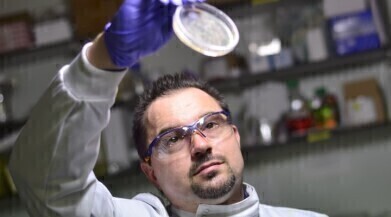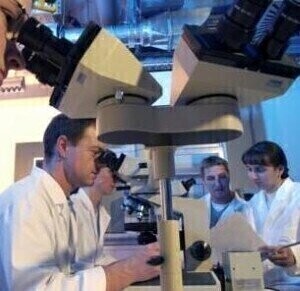-
 James Dixon
James Dixon -

News & Views
Gene Therapy boosts Bone Repair
Jun 19 2023
University of Nottingham spin out TherageniX, launched in collaboration with healthtech venture builder NLC, is developing technology that uses gene therapy to boost the body’s response to regenerate skin, bone, muscle and cartilage.
Developed by Dr James Dixon in the School of Pharmacy, the technology uses peptides and DNA or RNA to form nanoparticles capable of driving diseased or injured tissue to generate its own therapeutic molecules. It can be added to grafts taken from the patient’s own body (autologous grafts) in the form of powdered medicine while the patient is undergoing surgery. This will improve the regenerative capacity of the graft and is expected to lead to better outcomes, while reducing trauma at the graft donor site.
“Adapting our technology for a rapid application directly to grafted tissue within the operating theatre has been a vision for our gene delivery platform for several years, we have the opportunity here to bring regenerative medicine and gene therapy forward with innovative applications and apply it in ways we could not have envisaged only a few years ago. We hope that our system will generate a platform of transformative, economically viable and impactful approaches to clinical problems that remain poorly addressed in modern medicine,” said Dr Dixon.
Anandkumar Nandakumar, CEO of TherageniX, commented: “I am very excited about the technology and we have a unique approach to help patients with bone defects. We are only at the first step with the possibilities of this technology. In the future we can envision treating several types of defects and tissues and move towards personalized medicine.”
TherageniX has been supported by Nottingham Technology Ventures, which manages the University of Nottingham’s spin-out portfolio.
“We’re incredibly pleased to announce the launch of TherageniX and are looking forward to seeing the potential of this platform realised for orthopaedic applications. Delivery of gene therapies to the site of action is a critical challenge, which this innovation has the ability to solve. It is incredibly rewarding to see the work of Dr. Dixon and colleagues at the University of Nottingham recognised by this external investment,” added Alice MacGowan, Nottingham Technology Ventures.
More information online
Digital Edition
ILM 49.5 July
July 2024
Chromatography Articles - Understanding PFAS: Analysis and Implications Mass Spectrometry & Spectroscopy Articles - MS detection of Alzheimer’s blood-based biomarkers LIMS - Essent...
View all digital editions
Events
Jul 28 2024 San Diego, CA USA
Jul 30 2024 Jakarta, Indonesia
Jul 31 2024 Chengdu, China
ACS National Meeting - Fall 2024
Aug 18 2024 Denver, CO, USA
Aug 25 2024 Copenhagen, Denmark

.jpg)

24_06.jpg)













